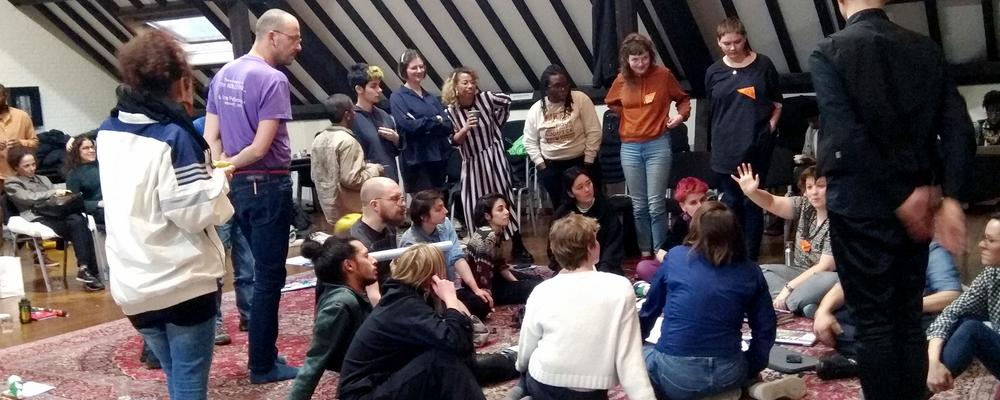
TTTT – Teaching To Transgress Toolbox
Teaching To Transgress Toolbox* (Erasmus Strategic Partnership, 2019–2022) is a collective research and study programme on critical pedagogy in the arts using artistic tools.
Based on peer-learning and collective research practices this EU-funded programme consists of workshops, public events, an open source online publishing platform and a publication. The programme is developed transnationally by three art schools: erg (Brussels, BE), HDK-Valand (Gothenburg, SE) and ISBA (Besançon, FR).
*The title is inspired by bell hooks' book "Teaching to Transgress: Education as the Practice of Freedom” (1994).
Questioning the assumed neutrality and equality in systems of schooling, production and consumption in the arts
Over the past ten years, tendencies towards polarisation and discrimination in wider society have had a perceptible influence on attitudes and behaviours within education, not to mention forceful impacts on learning and teaching in our classrooms. In attempts to meet these contemporary threats to diversity, questions about pedagogical inclusivity have risen to the forefront among European communities.
As three major art schools engaged in higher education (erg Brussels, ISBA Besançon and HDK-Valand), we identify the pressing need to respond to these political and social issues, and with urgency propose to address this historical challenge through a collective focus on questions of inclusive learning and teaching.
Intersectionality asserts that oppressions (based in racism, sexism, homophobia, classism, etcetera) are interconnected and cannot be examined separately from one another. Critical intersectional feminist pedagogies have, by now, been proven to provide valuable conceptual and practical tools with which to focus on inclusivity. This is particularly true in the field of art, where teaching is known to be open to devising and applying new critical frameworks, tools of analysis and creative practices
The programme's aim is to foster inclusive pedagogies and to question the assumed neutrality and equality in systems of schooling, production and consumption in the arts.
The programme is addressed to artists, researchers, students, teachers and administrators and invites people from various backgrounds, fields, abilities, gender identification, sexual orientation, ethnicity and religion to collectively explore how intersectional and de-colonial approaches can activate and spread embodied and theoretical knowledges.
Collective Research and Peer-learning
The programme is built on collective research and peer learning. This means that roles during the programme will be negotiated and are not based on a normative teacher student distinction. The resulting works, methods and tools – developed during the programme will be disseminated in multiple ways: practiced and tested in our respective local learning and teaching environments, shared on an open source online platform/archive, published in a print publication and discussed during several public events.
Participating schools
- erg, Brussels (Belgium)
- ISBA, Besançon (France)
- HDK-Valand (Sweden)
Website of the project
Funding
The project is an Erasmus Strategic Partnership (2019-2022) funded by the European Union.
HDK-Valand team
-
André Alves
-
Rose Brander
-
Ida Flik
-
Lani Fusako DuVall
-
Andreas Engman
-
Danielle Heath
-
Samantha Hookway
-
Gloria López
-
Åke Sjöberg
-
Kolbrún Inga Söring
-
Nontokozo Tshabalala
-
Eva Weinmayr
-
Lucy Wilson